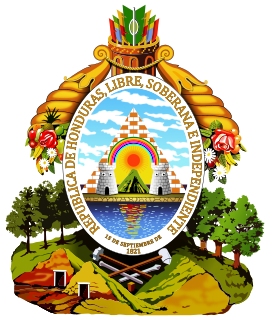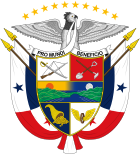
Panama, officially the Republic of Panama, is a transcontinental country spanning the central part of North America and the northern part of South America. It is bordered by Costa Rica to the west, Colombia to the southeast, the Caribbean Sea to the north, and the Pacific Ocean to the south. Its capital and largest city is Panama City, whose metropolitan area is home to nearly half the country's 4 million people.

Omar Efraín Torrijos Herrera was the Commander of the Panamanian National Guard and military leader of Panama from 1968 to his death in 1981. Torrijos was never officially the president of Panama, but instead held titles including "Maximum Leader of the Panamanian Revolution". Torrijos took power in a coup d'état and instituted a number of social reforms.

Mireya Elisa Moscoso Rodríguez de Arias is a Panamanian politician who served as the President of Panama from 1999 to 2004. She is the country's first female president.

General elections were held in Panama on Sunday, 2 May 2004, electing both a new President of the Republic and a new Legislative Assembly.

Martín Erasto Torrijos Espino is a Panamanian politician who was President of Panama from 2004 to 2009.

Guillermo David Endara Galimany was a Panamanian politician who served as the President of Panama from 1989 to 1994. Raised in a family allied to Panameñista Party founder Arnulfo Arias, Endara attended school in exile in the United States and Argentina following Arias's removal from power. Endara later received a law degree in Panama. He subsequently served as a member of Panama's National Assembly, and briefly as a government minister before heading into exile again following Arias' third overthrow.

The Democratic Revolutionary Party is a political party in Panama founded in 1979 by General Omar Torrijos. It is generally described as being positioned on the centre-left.

The People's Party is a Panamanian Christian democratic political party. Beginning in 1956, as Social Democratic Action, it was made up of middle-class professionals, intellectuals and students, with support from trade unions, particularly the Federation of Christian Workers. It went on to become one of Latin America's most conservative and anti-communist Christian democratic parties. The ideological foundation of the party is based on the social doctrine of the Catholic Church. The PP is a full member of the Christian Democrat International and Christian Democratic Organization of America.

The Panameñista Party is a nationalist political party in Panama. It was the third largest party by number of adherents with 256,138 members.
The Latin American and Caribbean Congress in Solidarity with the Independence of Puerto Rico consisted in an international summit held in Panama City, Panama. More than two-hundred delegates hailing from twenty-two countries in North and South America met on November 18–19, 2006 to discuss the issue of Puerto Rican sovereignty and proposed independence.

Balbina Del Carmen Herrera Araúz is a Panamanian politician and presidential candidate in the 2009 Panamanian general election. On May 3, 2009, she lost the race to the presidency of the Republic of Panama to center-right candidate Ricardo Martinelli.

Constituent Assembly elections were held in Honduras on 20 April 1980. In July the Assembly elected Policarpo Paz García as president.
General elections were held in Panama on 6 May 1984, electing both a new President of the Republic and a new Legislative Assembly.

General elections were held in Panama on 7 May 1989, with the goal of electing both a new President of the Republic and a new Legislative Assembly. The two primary candidates in the presidential race were Guillermo Endara, who headed Democratic Alliance of Civic Opposition (ADOC), a coalition opposed to military ruler Manuel Noriega, and Carlos Duque, who headed the pro-Noriega Democratic Revolutionary Party (PRD).

Parliamentary elections were held in Panama on 28 September 1980, electing a new National Legislative Council.
Indirect presidential elections were held in Panama on 11 October 1978, electing a new President of the Republic.

Parliamentary elections were held in Panama on 6 August 1972, electing both a new National Assembly of Community Representatives.

General elections were held in Panama on May 12, 1968, electing both a new President of the Republic and a new National Assembly.
Gerardo González Vernaza was a Panamanian politician from Veraguas Province. He served as Vice President of Panama and President of the National Assembly, serving in the latter post from 1997 to 1999.











